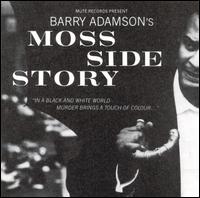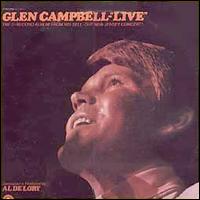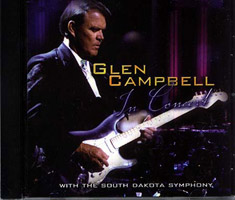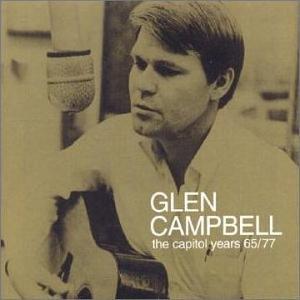
Glen Travis Campbell was an American guitarist, singer, songwriter, actor and television host. He was best known for a series of hit songs in the 1960s and 1970s, and for hosting The Glen Campbell Goodtime Hour on CBS television from 1969 until 1972. He released 64 albums in a career that spanned five decades, selling over 45 million records worldwide, including twelve gold albums, four platinum albums, and one double-platinum album.

The Essential Glen Campbell Volume One is the first of a series of three albums which cover Glen Campbell's recordings for Capitol Records between 1962 and 1979. The tracks are presented in a non-chronological order. All three Essential CDs contain, next to single and albums tracks, previously unreleased recordings. On The Essential Glen Campbell Volume One, these are "Twelve Blues", "I Walk the Line" and "Blue Sky Shining", from a 1979 recording session led by Nelson Riddle. The Essential albums are also notable for containing some of the songs from The Artistry of Glen Campbell, the only original studio album by Glen Campbell that has not been released on CD or as a digital download. Included here are "Banjo Garden" and "Shenandoah".

Moss Side Story is the debut album of British musician Barry Adamson released in 1989. The album is a concept album, a soundtrack album to a non-existent crime film.

Reunion: The Songs of Jimmy Webb is the twenty-seventh album by American singer and guitarist Glen Campbell, released in 1974.

This article presents the discography of American singer, songwriter, and guitarist Glen Campbell. Campbell recorded and released 60 studio albums and seven live albums between 1962 and 2017. He also lent his vocals to four soundtracks for motion pictures. He placed a total of 82 singles on either the Billboard Country Chart, the Billboard Hot 100, or the Adult Contemporary Chart, nine of which peaked at No. 1 on at least one of those charts.

No More Night is the forty-first album by American singer/guitarist Glen Campbell, released in 1985.

Bloodline is the thirty-first album by American singer/guitarist Glen Campbell, released in 1976.

Try a Little Kindness is the thirteenth album by American singer/guitarist Glen Campbell, released in 1970. The title track was one of Campbell's favorite songs.

Norwood is the soundtrack album by American musician Glen Campbell from his 1970 film Norwood. The album was released by Capitol Records in June 1970.

Glen Campbell Live is the first live album by American musician Glen Campbell, released in 1969. It features all of his hits up to that point, with the exceptions of the noticeably absent "Galveston" and "Wichita Lineman".

Glen Campbell in Concert with the South Dakota Symphony is the fifty-eighth album by American singer/guitarist Glen Campbell, released in 2001. Recorded for the PBS special "Glen Campbell – In Concert", the concert registration was released on video, CD and DVD.

I'll Paint You a Song is a compilation of the vocal tracks from the soundtrack albums Norwood and True Grit, plus "Private John Q," previously released as a 1965 Capitol single.

The Artistry of Glen Campbell is a double album from 1972 which was originally sold through the Glen Campbell Fan Club. The songs are made up of B-sides, previously unreleased material and new recordings of mainly public domain songs. The B-sides are taken from the following singles: "Dreams of the Everyday Housewife"/"Kelli Hoe Down" (1968), "True Grit"/"Hava Nagila" (1969), *"By the Time I Get to Phoenix-I Say a Little Prayer" /"All through the Night" (1971) and "Manhattan Kansas"/"Wayfaring Stranger" (1972). The second album contains instrumental songs only.

The Capitol Years 65/77 is a compilation album by Glen Campbell, released in Europe only on February 22, 1999. The double CD set contains previously released, single and album tracks that Campbell recorded for Capitol Records between 1965 and 1977.

Classic Campbell is a 3 disc compilation album issued by EMI in 2006, consisting of hit singles, album tracks and a few previously unreleased recordings from the sixties and the seventies. One album track makes its CD debut here, the instrumental "Wimoweh ", from The Astounding 12-String Guitar of Glen Campbell (1963).

Greatest Hits contains remixes of Glen Campbell's biggest hits. The songs are remixed using purely the original recordings, bringing out other nuances in the arrangements. The last two tracks on this compilation, "Times Like These" and "These Days", were pulled off Campbell's recent studio album Meet Glen Campbell.
American country music singer Glen Campbell released fifteen video albums and was featured in twenty-one music videos in his lifetime. His first two music videos, "By the Time I Get to Phoenix" and "Wichita Lineman", were directed by Gene Weed in 1967 and 1968 respectively. Campbell released his final music video, "I'm Not Gonna Miss You", in 2014 to coincide with the release of the documentary Glen Campbell: I'll Be Me.
"True Grit" is a song written by Don Black and Elmer Bernstein, and recorded by American country music artist Glen Campbell. It was released in July 1969 as the first single from his album True Grit. The song peaked at number 9 on the Billboard Hot Country Singles chart. It also reached number 1 on the RPM Country Tracks chart in Canada.

Sweet Smell of Success is the soundtrack to the 1957 Hecht-Hill-Lancaster Productions film of the same name. The music from the film was released by Decca Records in June 1957 on two separate long play records; one featuring Elmer Bernstein's score, the other with Chico Hamilton Quintet's music.

















